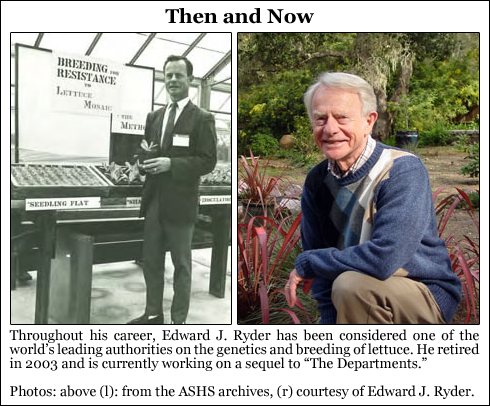Reviews - The Departments
Small Press Bookwatch: March 2010
James A. Cox, Editor-in-Chief
Midwest Book Review
Reviewer's Choice
Science is in the business of asking why, and sometimes science itself is asked why. "The Departments" is a story of a university faced with this question of why their work is important and why they do what they do. A small town is held up by its university, but the university's purpose is brought into question, and its researchers and scientists are faced with this question.
Philosophical, educational, and riveting, "The Departments" is a choice and very highly recommended pick.
New Books, Websites
Book Reviews
Jules Janick
This concise novel about university politics in Western University, a fictional Land Grant institution in the United States, is a first in many ways in that the action centers on plant breeding and the author is a horticulturist! The plot line revolves around the resignation of an onion breeder in the Plant Science Department in the College of Agriculture (created from combining Agronomy and Horticulture Departments) and the ensuing struggle between the plant breeders and molecular biologists for the new position. The issue soon envelops the 26 other members of Plant Science as well as some faculty in two other departments in another college which compete for the empty position, various deans, and the new president of the university, who is drawn into the problem. The protagonists will be readily familiar by all members of academe. Non-horticulturists and non-scientists will receive an education in the science and art of plant breeding as well as an introduction to molecular biology. The plot has interesting twists and turns and I will not give them away except to say that the issues are current, the characters recognizable, and the read was enjoyable.
This novel follows a long tradition of immersing the reader into the confined world of a tightly wound institution. My favorite is the comic Victorian novel Barchester Towers by Anthony Trollope that draws us into a cathedral community where the Anglican clergy struggle over the appointment of a new bishop. A closer comparison is The Masters by C.P. Snow where university dons connive and compete in the election of the new Master at Cambridge college. More recently, and on point, is Moo by Jane Smiley, where the strange world of a U.S. Midwestern landgrant university and its cast of characters are hilariously presented. I suspect Ed Ryder, my good friend of many years (we were fellow students at the same high school as well as at Cornell University), is most interested in expressing his thoughts on the role of plant breeding, but I must say I found the portrait of the new president incisive and accurate. I await the sequel to see if President Clifford survives.
Jules Janick, Purdue University
 www.ashs.org
www.ashs.org
American Society for Horticultural Science
Notes from the Archivist
Donald N. Maynard
ASHS Emeritus Member Profile:
Edward J. Ryder
ASHS member since 1957
1995 ASHS Outstanding Researcher
1978 ASHS Fellow
Edward Ryder, an ASHS member for more than 50 years and currently an Emeritus member, has changed hats and is now a published author of fiction. He was born in New York City and attended local grammar and high schools. He enrolled at Cornell University, where he received a BS degree in botanical sciences. Ed was accepted in the graduate program at the University of California, Davis, and earned a PhD in genetics and plant breeding. After serving 2 years in the U.S. Army, he began a long productive career as a plant breeder with the U.S. Department of Agriculture in Salinas, California. He produced over 100 scientific horticultural publications related to his work, including two books, numerous book chapters, review articles, and research papers. Ed's Lettuce, Endive, and Chicory book published by CABI in 1999 remains as the definitive work on these crops. He retired in 2003, and now enjoys reading and gardening as well as his latest endeavour—writing novels.
About "The Departments"
Western State University is the setting for "The Departments," specifically the Plant Science Department that is made up of faculty from the former Horticulture and Agronomy Departments. Sound familiar? There are still some scars from the merger, but most faculty are at least civil to those in the other disciplines. That is, until Jack Crampton, a plant breeder specializing in improved germplasm for the state's onion producers, announces that he is leaving to accept a position in the seed industry. That's when the plant breeding and molecular genetics faculty draw a line in the sand for continuing the onion breeding program or creating a new position in molecular biology. After numerous faculty meetings and meetings of those on either side of the issue the Department is no closer to agreeing on either position.
Meanwhile, the University has selected a new President, John Clifford, recently arrived from Landon State University. Traditionally, vacant positions are returned to the Department where they originated even with minimal justification. But, what will the new President do? To make matters worse for the Plant Sciences Department competing well-justified requests are being submitted by the Government Department to focus on environmental law, policy and politics and by the Sociology Department to create a new position on urban sociology of the inner city.
The stage is set for a battle within the Plant Sciences Department and within Western State University for the right to fill Jack Crampton's position.
How will it turn out? Will the Plant Sciences be able to mend hurt feelings to once again become a productive and collegial department? You must read the book to answer these and other questions.
Archivist Note: "The Departments" is a good read—one that ASHS members can relate to as similar departmental mergers have occurred in many Land Grant Universities across the country.
Donald N. Maynard
ASHS Archivist/Historian

